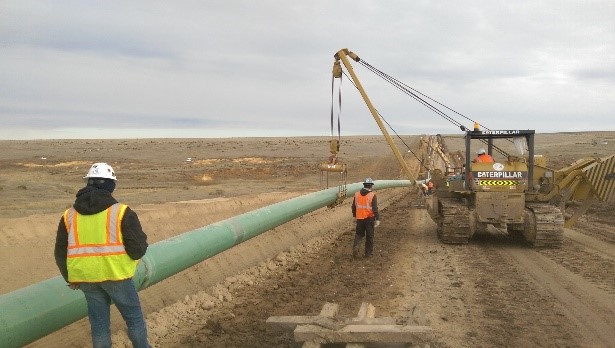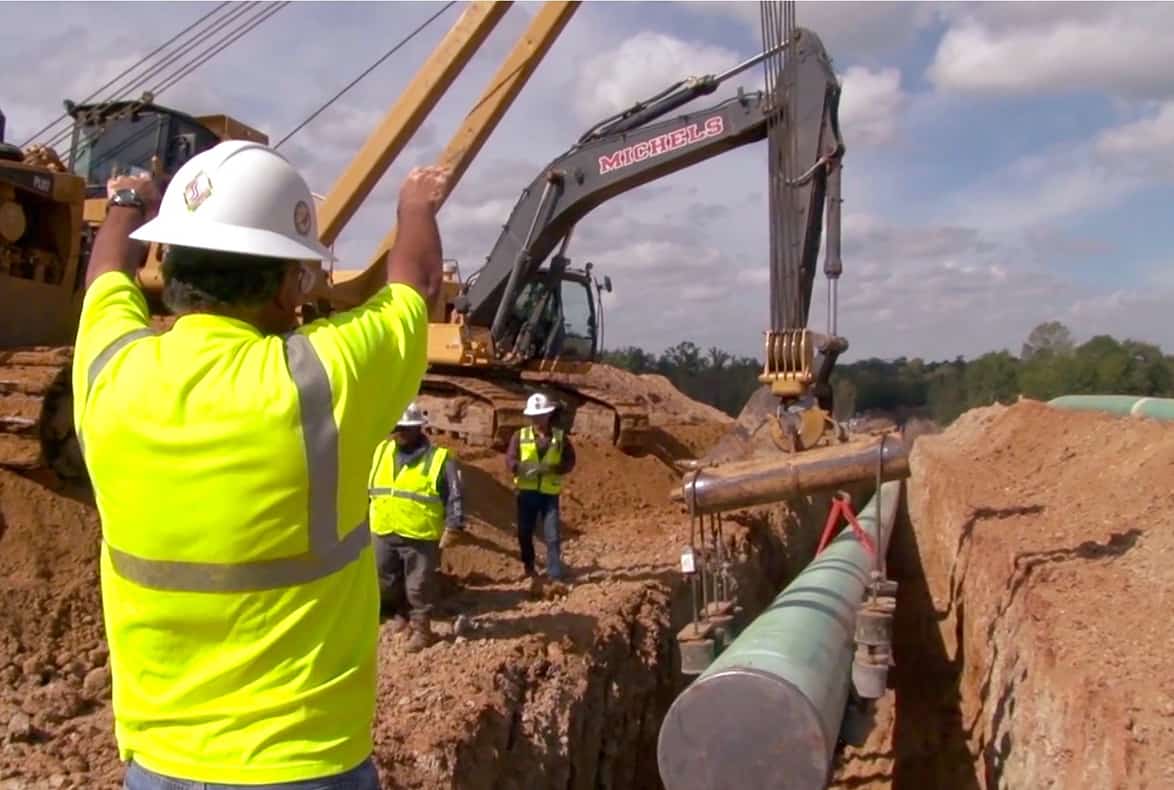A Comprehensive Overview to Comprehending Pipes and Their Role in Building
Pipelines are crucial parts in building, serving crucial features in water, gas, and waste management. Their option and application can greatly influence a structure's effectiveness and safety. Various products, such as PVC, copper, and PEX, supply distinctive advantages suited to certain needs (Creek Pipe Pipeline Construction). Recognizing these elements is key for any kind of construction job. As one explores the intricacies of pipes, the implications for compliance and public health become progressively apparent
The Importance of Water Lines in Construction
Pipelines act as necessary channels in construction, assisting in the movement of water, gas, and waste throughout buildings and infrastructure. Their function expands beyond plain transportation; they are important for guaranteeing the capability and safety of household and business settings. Correctly set up pipelines add to the reliable distribution of resources, allowing everyday tasks such as bathing, home heating, and cooking. Pipelines play a critical function in waste monitoring, making certain that sewer and wastewater are effectively eliminated from living spaces.The relevance of pipelines is additionally mirrored in their impact on public health and wellness. Poor or damaged piping systems can lead to contamination and dangerous conditions, making high quality materials and installation practices imperative. Additionally, pipelines have to adhere to numerous building ordinance and regulations, which are designed to shield both owners and the environment. The relevance of pipes in construction encompasses both sensible capability and essential wellness considerations.
Types of Piping Made Use Of in Structure Projects
Numerous types of pipes play a substantial duty in building projects, each created to meet specific demands and applications. Among one of the most commonly utilized pipe kinds are PVC, which is resistant and lightweight to corrosion, making it excellent for drain and vent systems. CPVC pipes, similar to PVC, can stand up to greater temperature levels, commonly used in hot water systems. Copper pipelines are known for their longevity and dependability, often used in plumbing and home heating applications. Galvanized steel pipelines, while less common today, were when a criterion for water system lines as a result of their stamina. In Addition, PEX (cross-linked polyethylene) pipes are obtaining popularity for property pipes because of their flexibility and resistance to scaling and chlorine. Cast iron pipes are preferred for their sound-dampening properties, frequently used in waste and soil systems. Each pipe kind offers distinctive features, making certain efficient operation in building jobs.
Usual Materials for Pipeline and Their Feature
In construction, the choice of pipe products is essential for ensuring resilience and performance. Steel pipes provide toughness and resistance to high stress, while plastic pipelines offer corrosion-resistant and light-weight choices. Compound pipelines integrate the advantages of both products, making them flexible options for various applications.
Metal Pipe Options
Steel pipelines are essential parts in building and construction, using a series of choices that deal with environmental conditions and different applications. One of the most typical materials include steel, copper, and cast iron. Steel pipes are recognized for their toughness and longevity, making them ideal for high-pressure applications. Copper pipes are preferred for their corrosion resistance and antimicrobial residential or commercial properties, frequently used in pipes systems. Cast iron pipes provide excellent audio insulation and are suitable for waste and drain systems. Each steel kind has unique advantages; as an example, galvanized steel can withstand rust, while stainless steel offers premium rust resistance. Selecting the ideal steel pipeline depends on variables such as expense, environmental direct exposure, and the details demands of the construction task.

Plastic Pipe Advantages
Plastic pipelines have gotten appeal in construction as a result of their lightweight nature and convenience. These pipes, made from materials such as PVC, CPVC, and PE, deal outstanding resistance to corrosion and chemical damage, making them ideal for various applications. Their simplicity of installment additional enhances their charm, as they can be reduced and joined without unique devices. Additionally, plastic pipes are normally extra cost-efficient compared to metal alternatives, adding to lower overall job expenditures. Their smooth indoor surfaces reduce friction and enhance circulation prices, while insulation homes assist keep temperature level control in pipes systems - Creek Pipe Pipeline Construction. With a variety of configurations and sizes available, plastic pipes efficiently satisfy the varied requirements of modern-day building and construction tasks
Compound Pipeline Characteristics
Compound pipes integrate different materials to take advantage of their private staminas, leading to improved performance and toughness. Usually, these pipelines include layers that may include ceramics, plastics, and metals, each adding one-of-a-kind residential or commercial properties. The internal layer may be made of a corrosion-resistant material, while the outer layer provides strength and influence resistance. This combination permits composite pipelines to stand up to severe temperatures and pressures, making them suitable for a vast array of applications, consisting of supply of water and industrial processes. In addition, composite pipelines are frequently lighter than traditional products, helping with easier handling and installment. Their adaptability and versatility to various settings make them a favored choice in modern-day construction tasks, ensuring longevity and performance in liquid transportation systems.
Applications of Pipes in Plumbing Systems

Electrical Conduits: The Role of Pipeline in Electrical wiring
In modern-day construction, electrical conduits play a necessary duty in making certain the risk-free and reliable directing of electrical wiring throughout structures. These pipes give a safety path for electric cords, guarding them from physical damages and environmental factors. Various materials, such as PVC, metal, and adaptable conduits, are made use of relying on the details requirements of the installation.Furthermore, channels aid see in arranging electrical wiring systems, minimizing the risk of electric threats like brief circuits or fires. They likewise promote simpler maintenance and upgrades, as cords can be accessed and replaced without considerable disruption to the structure.Proper setup of electrical avenues is crucial for conformity with building ordinance and safety guidelines. This structured approach not only boosts the durability of the electrical system but also contributes to the overall security and functionality of the structure, making electric conduits indispensable in contemporary construction techniques.
Picking the Right Pipe for Your Task
Just how can one assure the right pipe selection for a construction task? The selection process begins with understanding the certain needs of the project, consisting of the sort of fluids being transferred, stress ratings, and ecological conditions. Product options, such as Steel, pvc, and copper, need to be assessed based on toughness, rust resistance, and thermal properties.Next, one should take into consideration the pipe's size and flow capability to determine reliable operation. Governing standards and codes should likewise be stuck to, as they determine the acceptable materials and techniques for details applications. Consulting with professionals and making use of considerable sources can better aid in making informed decisions.Finally, evaluating the cost-effectiveness of numerous choices is crucial, balancing preliminary expenditures with long-lasting upkeep and replacement costs - Creek Pipe Company LLC. By thoroughly examining these factors, one can confidently pick the most suitable pipeline for their building task, guaranteeing both performance and conformity

Maintenance and Examination of Water Lines in Building
Appropriate selection of pipelines establishes the foundation for their lasting performance, making maintenance and examination important components in construction. Routine maintenance warranties that any type of potential concerns, such as leaks, rust, or blockages, are recognized and dealt with promptly, decreasing costly repairs and task delays. Set up evaluations, consisting of visual assessments and stress tests, play a crucial function in reviewing the stability of pipe systems.Additionally, keeping an eye on environmental aspects, such as their explanation temperature level fluctuations and dirt conditions, can assist prepare for wear and tear. Using advanced technologies, such as CCTV for indoor evaluations, can boost the effectiveness of maintenance initiatives. It is critical to document assessment searchings for and maintenance tasks to develop a complete background of the pipe systems. By prioritizing upkeep and assessment, construction experts can expand the life-span of their piping systems, guaranteeing they operate effectively and dependably throughout the task's period.
Frequently Asked Inquiries
Exactly How Do Pipes Impact Power Performance in Structures?
Pipes substantially affect power performance in structures by regulating home heating and cooling down systems. Correct insulation and products lower power loss, while reliable pipes layouts decrease water use, inevitably leading to lower power usage and functional expenses.
What Laws Govern Pipe Setup in Building And Construction?
Rules regulating pipe setup in building commonly consist of nationwide and regional structure codes, pipes codes, and safety criteria. These guarantee compliance with structural integrity, material specs, and health and wellness demands, advertising security and effectiveness in construction practices.
Can Pipeline Be Recycled After Usage?
The question of pipeline recyclability is considerable. Many products, such as steel and specific plastics, can be reused successfully. The problem and type of pipeline impact recycling usefulness, requiring correct assessment prior to disposal.
How Do Weather Condition Conditions Effect Pipeline Performance?
Weather condition problems significantly affect pipe efficiency. Severe temperatures can trigger growth or contraction, while wetness might lead to rust. In addition, hefty precipitation can boost dirt pressure, impacting security and general functionality of the piping system.
What Are the Indicators of Pipeline Failure to Look For?
Indications of pipeline failure consist of leaks, unusual sounds, staining of water, minimized water pressure, and visible deterioration. Normal evaluations can aid find these concerns early, ensuring and preventing expensive repair services system capability in the long-term. Pipelines play a crucial role in waste administration, making certain that sewer and wastewater are properly gotten rid of from living spaces.The relevance of pipes is likewise shown in their effect on public health and wellness. In building, the option of pipe materials is crucial for guaranteeing toughness and capability. Steel pipelines supply toughness and resistance to high stress, while plastic pipelines offer corrosion-resistant and lightweight alternatives. Furthermore, pipes are used to get rid of wastewater, attaching bathrooms, sinks, and drains pipes to local sewage systems or septic tanks.Different types of pipelines, such as PVC, copper, and PEX, are picked based on elements like toughness, expense, and details application needs. How can one guarantee the best pipe option for a building and construction job?